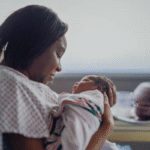Chipeta Promise was seven when her father died, an incident that changed her life dramatically. Her grieving mother opted to live closer to her extended family, moving from Blantyre to Mzuzu, in Malawi’s northern region.
Her mother, a primary-school teacher, struggled to keep body and soul together. She enrolled her daughter in a crowded public school, where Promise recalls being bullied “in ways that affected my self-esteem.”
Out of her distressing situation, she found an unlikely lifeline—poetry. She wrote verses that grieved her father’s death and expressed her girlish fantasies.
“I got invested in poetry so I could, like, express my feelings in poetry,” she says.
This creative pursuit opened a vista of opportunities before long. Promise’s poetry earned her a scholarship at an international high school. For the first time in her life, she experienced a broader view of education, beyond her mother’s means.
Yet a defining moment came in 2017 when she was selected to attend a United Nations Foundation science camp for girls only. More than 90 girls—from across Malawi, Liberia, Zambia, Tanzania, and even the United States—were present at the camp.
For a teenager that contended with bullying and low self-esteem, Promise describes the girls at the camp as accommodating. “I never felt like I had to suppress myself to fit in or change who I am, to fit in with other groups. I just had to be myself, and people accepted me the way I was,” she explains.
The warmth and support exuded at the camp prompted her, at just 15, to establish a Girl Up United Nations Foundation club back at home.
Building safe spaces for girls in Malawi
Through the club, Promise visited schools to speak with teenage girls across Malawi’s schools about menstrual hygiene, bullying and self-esteem—topics that mirrored her own struggles.
“I didn’t want other girls to go through that same pain,” she says. “I wanted them to have a safe space where they could belong.”
The community club soon expanded in scope, empowering teenage girls with practical leadership training to fill in a national education deficit.
In 2023 roughly 26% of Malawi’s female adolescents of school age were out of school.
After secondary school in 2018, Promise got into DMI St. John the Baptist University in Malawi. Within one semester, however, she was forced to withdraw. Her mother had taken out loans to cover the fees, which had become unbearably high.
“How do I keep speaking about education when I can’t afford my own?” Promise wondered, devastated. She clung to her Christian faith, urging herself, “If I wake up every morning, that means I have a purpose.”
She threw herself deeper into volunteer work. In 2019 she joined Operation Smile Malawi as a student leader, later serving on its Global Leadership Council.
Her persistence soon paid off. In 2019, she was invited to Washington, D.C., to attend the Girl Up leadership summit, which she co-hosted as a master of ceremonies and led an “Inspire” session.
Meeting peers from different continents expanded her perspectives. Their challenges were similar to hers.
In 2020, Promise became one of the first Africans selected for the Girl Up university scholarship. By 2021, she was back at DMI St John the Baptist University, starting from scratch.
Her prior setback fuelled her zeal to stay on top of her class, finishing with a first-class degree in Social Work and Community Development. For her, the achievement was more than academic.
“Doing community work actually paved a way for me to be educated. It wasn’t just because I had excellent grades. The whole scholarship was around my community service and what I’ve been doing in my community,” Promise says.
To revive her Girl Up club, she engaged university students in projects that addressed sexual and reproductive health rights, gender equality, leadership and community charity.
The club sustained itself through a slew of avenues, such as small monthly membership contributions, project grants from the Girl Up headquarters, donations from well-wishers and partnerships with NGOs.
The club relied mostly on a grant from the Girl Up United Nations Foundation, which funds its donations to various hospitals and schools.
Despite its predominant attention on girls, the club extended its charity to boy children. “It would be really bad to just help the girls and leave out the boys,” Promise notes.
Expanding her reach
Venturing into sports, Promise partnered with Africathletics, an Italy-based organisation, using rugby to inculcate discipline and leadership in young girls across Malawi.
“We wanted them to know they can be strong, they can take up space, and they can still excel in school,” she explains.
Several of the girls who joined those camps have gone on to pursue their goals with renewed confidence, even when their communities discouraged them.
This progress skates over funding challenges, Promise admits. Grants are unpredictable, hampering many potential ideas.
Volunteerism, too, is misunderstood. “Many people think volunteering is only for the rich or that it should always come with pay,” she says.
After six years of service, she has seen how such attitudes limit the impacts of grassroots organisations.
“People would ask me, ‘Do you have a guy that’s leading beside you?’” Promise says, highlighting the persisting gender stereotypes that undermine her work as a young woman. She has learnt to let results speak louder than prejudice.
In 2023, she conceived the VytalRise Movement, her most ambitious project.
Still under registration, VytalRise leverages psychosocial counselling, sports and leadership training to help survivors of trauma and abuse reclaim their fire.
Her inspiration draws on the last Mental Health and Suicide Prevention month, during which she piloted small gatherings—called “safe circles”—that encouraged survivors to share their experiences. The response was overwhelming.
“People were already reaching out and asking if we could have the circles weekly,” she says. “They felt safe when they heard from others going through the same struggles.”
Promise is currently being trained as a psychosocial counsellor, equipping herself with the skills to support vulnerable communities. She envisions VytalRise as a vision of infrastructure, staffed with professional counsellors, and stretching beyond Malawi in the next five years.
She expresses plans for registered offices and partnerships with government and football teams to complement rugby. She also wants to adopt a model that integrates psychosocial support with education and leadership pathways.
Nevertheless, she notes that impact is not measured in numbers but in stories: the girl who returned to school after dropping out, the teenager who stood her ground against discouragement, the survivor who spoke up for the first time in a safe circle.
“They’re fighting for themselves without the presence of us having to, like, do it for them. So it shows that we’re not just doing this in vain. We are actually making an impact, ” she says with pride.
Summary not available at this time.






